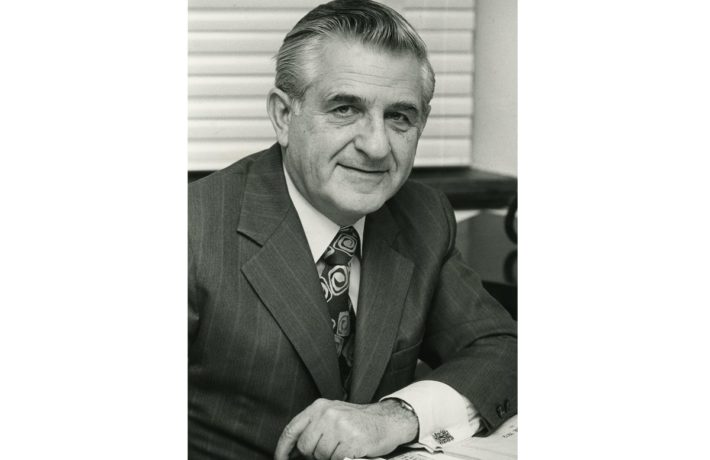
June 23, 1909 – May 23, 1981
David Lewis was a Canadian politician, lawyer, author and university professor. Born and raised in Russia, David Losz’s childhood was marked by the German invasion of Russia during the First World War, and the Russian Revolution. After witnessing these world-changing events, the Losz family moved to Canada in 1921, where they settled in Montreal, Que., and their name was anglicized to Lewis.
From 1927 to 1932, Lewis attended McGill University in Montreal, where he studied arts and law, and was active in municipal socialist politics. He was awarded the Rhodes scholarship to attend Oxford University in Oxford, England, where he became active in the British Labour Party. Returning to Canada in 1935, Lewis married and began to practise law in Ottawa. In 1936, he began working as a national secretary for the Co-operative Commonwealth Federation (CCF) and became a key theorist and member of the League for Social Reconstruction. In 1943, Lewis co-authored Make This Your Canada with F.R. Scott, and ran unsuccessfully as CCF candidate for Parliament in 1940, 1943, 1945 and 1949. After 1950, Lewis continued his involvement with CCF while practising labour law. In 1961, Lewis’ involvement proved significant in the formation of the New Democratic Party (NDP). In effect, the CCF transformed from a western, farm-based organization into a more urban and competitive NDP.
Lewis won his first election to Parliament in the Toronto riding of York South in 1962. He lost the seat in 1963, but was re-elected in 1965, 1968 and 1972 before losing the seat again in 1974. He proved himself as an impressive debater in Parliament and in 1971 Lewis succeeded Tommy Douglas as leader of the NDP—becoming the first and only, to date, Jewish leader of a federal political party in Canada. From 1972 to 1974, with Pierre Trudeau leading a Liberal minority Government, Lewis’ NDP held the balance of power.
Lewis stepped down from his position as NDP leader in 1975 following his federal-election defeat, and became a professor of Canadian studies at Carleton University in Ottawa. Lewis also devoted himself to writing at this time and completed The Good Fight: Political Memoirs 1909-1958. This was the first book in what was to be a two-volume autobiography, however, Lewis died in Ottawa shortly after The Good Fight was published.
As Lewis was very much a product of the social-democratic movement, he was also a product of his Jewish background. Through his involvement with socialism around the world, he was able to form relationships with Israeli leaders, including Golda Meir and Shimon Peres. He loved Jewish literature, and was fluent in Yiddish. Although he was often criticized as being anti-Israel, Lewis was supportive of the Jewish state, and was involved with its labour party and social programs—serving as a member on committees of the Canadian Jewish Congress, the Jewish Labour Committee, the Workmen’s Circle, and the Farband Labour Zionist Order.
Lewis was not outwardly religious and did not belong to a synagogue, but he was honoured and accepted by the Jewish communities of Ottawa and Montreal, especially for his work for Holocaust survivors. He helped expedite the immigration process of Holocaust survivors into Canada, and was responsible for securing visas for Jewish refugees that had fled to China and Japan.
Images-
Featured Photo: David Lewis [ca. 1975]. Ottawa Jewish Archives, L-026